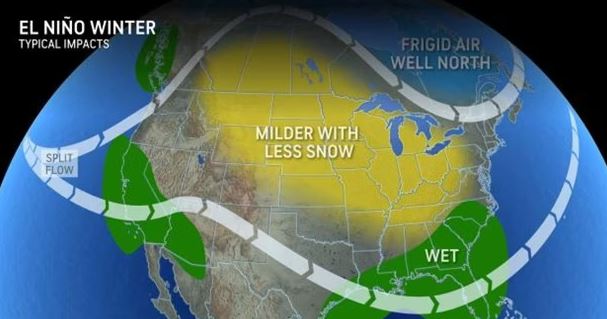El Nino and Climate Change Shape Mild and Unpredictable Season

The US winter forecast, provided by federal forecasters, anticipates reduced snowfall and milder temperatures, shaped by the influence of a strong El Nino pattern and climate change. (Photo: townandcountrytoday)
Diverse Climate Expectations Highlighted in the US Winter Forecast
According to usnews.com, The US winter forecast, as provided by federal forecasters, anticipates a season marked by reduced snowfall and milder temperatures. This US winter forecast is notably shaped by the influence of a strong El Nino pattern, which not only alters storm tracks but is also accentuated by the consequences of climate change.
While the northern US regions are poised to witness rain instead of snow, a feature associated with the warming trend the US winter forecast acknowledges that the Mid-Atlantic and the East Coast may still encounter notable snowfall due to the occasional Nor’easters. The comprehensive US winter forecast reflects expectations of above-average temperatures across much of the nation with a focus on Alaska, the Pacific Northwest and northern New England.
Moreover, a substantial portion of the southern United States is projected to receive heightened precipitation encompassing regions spanning from the East Coast to the South and parts of the West. Nonetheless, in this US winter forecast, it is indicated that the Great Lakes region and the northernmost areas of the country are anticipated to experience drier conditions compared to their usual winter patterns.
READ ALSO: New Hottest September On Record: Records High Margin Toppled
El Nino and Climate Change Dynamics Shape Uncertain Winter Weather Outlook
The US winter forecast takes into account the substantial impact of El Nino, a recurrent warming phenomenon in the Pacific Ocean, which significantly shapes winter weather patterns by rerouting the jet stream and causing increased rainfall in the South. Additionally, the effect of climate change is a critical factor within this US winter forecast, as it contributes to the overall warming pattern witnessed over the past four decades in winter climates.
While this US winter forecast aligns with the consensus among meteorologists, it’s crucial to be prepared for potential “weather whiplash” along the East Coast, characterized by overall reduced snowfall but the prospect of occasional significant snowstorms, particularly in the Mid-Atlantic region.
In addition, private weather firms such as AccuWeather provide their distinct perspectives within the US winter forecast, including expectations of below-average snowfall in various major cities, alongside varying temperature predictions compared to the federal forecast.
READ ALSO: Hurricane Season May Have An Eventful And Exceptional End, Experts Fear
























